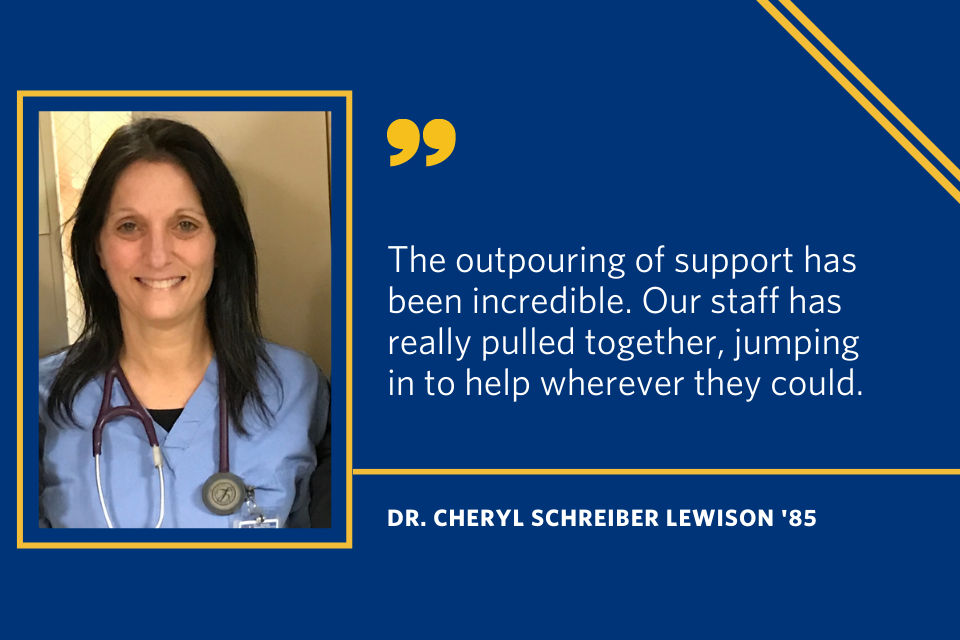Brandeis Alumni, Family and Friends
Dr. Cheryl Schreiber Lewison ’85 on the Front Line Against Coronavirus

Dr. Cheryl Schreiber Lewison ’85, associate director of the Department of Emergency Medicine at Queens Hospital Center in New York City, has been immersed in the fight against COVID-19.
The Brandeis Alumni Association asked her to share her experience with the Brandeis community.
We are one of the epicenters of the coronavirus in New York City. Since the coronavirus surge hit NYC, I have been working up to six days a week. I work some night shifts (7 p.m. to 7 a.m.) as well as some day shifts (7 a.m. to 7 p.m.). Our hospital was hit hard. Our emergency department has approximately 60 beds. At the height of the COVID surge, we had about 190 patients in our ED, including many patients admitted and on ventilators, awaiting ICU beds. It was terrifying, as many patients were coming in, talking and texting, with oxygen levels that seemed incompatible with life and chest X-rays that were equally horrifying.
Patients were talking and texting one minute, and being resuscitated the next. The experience is emotionally taxing, and then made worse when staff and their family members are getting sick, and presenting as patients. There have been so many challenges. Resources have been a huge issue, something all hospitals have had to confront. We slowly converted almost every space in our emergency department to hot zones, leaving one small area to care for non-COVID patients.
I have lived in fear of catching the virus and bringing it home to my husband. Everyday I wake up and check my temperature and my oxygen-saturation level, and hope that I remain healthy. Every little sniffle, sneeze or cough worries me. But more challenging is going into work, and seeing so many young and old—seemingly healthy—people, afflicted by the virus, and watching them suffer without their families and friends nearby to comfort them.
I spend a lot of time calling families to update them on the status of their loved ones. Since visitors haven’t been allowed in the emergency department, we are calling as many families as we can. The hardest calls are telling family members their loved ones have passed away, knowing they couldn’t be there to hold their hand, to say goodbye or tell them they loved them.
The outpouring of support has been incredible. Our staff has really pulled together, jumping in to help wherever they could. We’ve had doctors, both locally and from across the country, volunteering their time to help wherever needed. We've had neighborhood restaurants donating food to our staff on a daily basis, and local organizations and residents donating personal protective equipment (PPE). Friends and relatives have reached out and checked in, making sure I was okay and had enough PPE to keep me safe.
I certainly don’t feel like a hero. We’ve all had to put our lives on hold. I can’t imagine what it would be like to be a college or high school senior right now, not able to enjoy the celebrations and parties, prom or graduation. My most memorable time at Brandeis was Senior Week, a week I would have re-lived over and over again. My husband and I are theme-park enthusiasts, and spend whatever free time we can traveling, trying to ride as many roller coasters as we can. We were even featured in an episode of Great Big Story that documented our love of roller coasters and travel. My husband is a college professor whose research focuses on theme parks and tourism, so our travel supplements his research. We both see the importance and necessity of sheltering at home and social distancing. It’s been rough not being able to see family and friends, but like everyone else, we've learned to live virtually.
As a kid, I thought I’d become a doctor, but then someone somewhere along the way convinced me I’d make a good lawyer. I went to law school straight out of college, and practiced law for eight years, never really feeling satisfied with my career choice. I realized I’d never be happy unless I pursued a career in medicine. I like the energy and pace of emergency medicine. Before COVID-19, you really never knew who would come through the doors with what complaint or medical condition. Now, while we are seeing mostly only COVID-19 patients, we have been learning as we go, and we are taking what we learned from this last surge, and improving upon it for the next anticipated surge of cases. It’s the crisis we have trained for, but hoped we’d never see.
This virus is going to be with us for a long time. While the number of cases seems to be on the decline, we are still seeing many deaths from COVID-19. We anticipate a worse surge this fall and winter. This is not going to go away anytime soon and will likely always be a part of our differential diagnoses. We need to continue to stay home, practice social distancing, avoid large gatherings, wash hands frequently, wear masks, and avoid touching our eyes, nose, and mouth. I know this is all a lot easier said than done, but I’ve seen young, healthy people, who went out with friends, thinking this was no different than the flu, and then become severely ill from this virus. I have watched young and old people die. It’s been heart-wrenching and horrifying. People will need to make sacrifices to stay safe and healthy.
Read additional reflections from Brandeis alumni on the front line in New York City.
Published On: April 19, 2020






